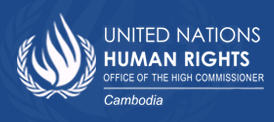Overview
The Rule of Law Programme works to strengthen the protection of human rights under the rule of law in Cambodia. It consists of three inter-linked components:
- Treaty ratification and reporting
- Institution building
- Compliance with international norms and procedures
Treaty ratification and reporting
This component seeks to strengthen the legal framework under which human rights are protected in Cambodia. We promote ratification and effective implementation of the international human rights treaties. Additionally, we support the Government in preparing their periodic reports to the treaty bodies.
To date, Cambodia is party to eight of the nine core human rights treaties:
- International Covenant on Economic, Social and Cultural Rights (ICESCR)
- International Covenant on Civil and Political Rights (ICCPR)
- International Convention on the Elimination of All Forms of Racial Discrimination (ICERD)
- Convention on the Elimination of Discrimination against Women (CEDAW)
- Convention against Torture and Other Cruel, Inhuman or Degrading Treatment or Punishment (CAT)
- Convention on the Rights of the Child (CRC)
- Convention on the Rights of Persons with Disabilities (CRDP)
- Convention for the Protection of All Persons from Enforced Disappearance (CED).
Cambodia has also signed the Convention on the Protection of the Rights of Migrant Workers and Members of their Families (CMW). Signing a treaty signifies a commitment by the Government to ratify the treaty in the near future.
Cambodia has also ratified a number of optional protocols to these treaties, which impose additional obligations on the Government: the Optional Protocol to the Convention against Torture (OPCAT); the Optional Protocol to CEDAW (OP-CEDAW); and the two Optional Protocols to the Convention on the Rights of the Child dealing with child soldiers and with child exploitation (CRC-OPAC and CRC-OPSC).
The application of these treaties in Cambodia is guaranteed under article 31 of the Cambodian Constitution. In 2007, after a petition from child rights NGOs supported by OHCHR, the Cambodian Constitutional Council issued a ruling clarifying that the human rights treaties ratified by Cambodia are part of domestic Cambodian law and should be applied by judges in the courts. For more information, click
here.
For more information on Cambodia's treaty obligations,
click here.
Institution building
This component seeks to strengthen the existing state institutions mandated to protect and promote human rights in Cambodia and to advise on the creation of new institutions. Existing institutions include:
- The judiciary
- The Supreme Council of Magistracy
- The Constitutional Council
OHCHR works as the development partner co-facilitator of the Technical Working Group on Legal and Judicial Reform with the Royal Government and other donors to strengthen these institutions in accordance with international standards within the framework of Cambodia's legal and judicial reform strategy. Some of this work involves:
- Implementation of the three Fundamental Laws on the Judiciary and the Code of Criminal Procedure
- Installation of the criminal case database in all courts of first instance
- Adoption of a legal aid policy
- Improving coordination within the criminal justice system
- Improving the accessibility of the system for persons with disabilities
- Encouraging the use of IHRL in court proceedings
Compliance with international norms and procedures
This final component seeks to ensure that officials working within the institutions charged with the protection of human rights carry out their responsibilities in accordance with international human rights standards.
Current areas of focus include:
- Monitoring and supporting an improved implementation of the Code of Criminal Procedure in the courts;
- Monitoring and supporting the prevention of torture and other ill treatment;
- Monitoring and supporting the prevention of excessive detention.
The Rule of Law Programme works closely with the Prison Reform Support Programme to identify root causes and matters of concern, which are then taken to the relevant authorities in order to seek solutions within a spirit of constructive dialogue.
The Rule of Law Programme is also working to use good practices developed by the ECCC to promote improvements in the administration of justice. For more information about OHCHR-Cambodia's ECCC legacy program, click
here.
The overarching long-term objective is to ensure that everyone in Cambodia has access to an effective remedy when their human rights have been violated.
Also see (in English):
United Nations Special Rapporteur on the Independence of Judges and Lawyers
OHCHR Geneva - Rule of Law
